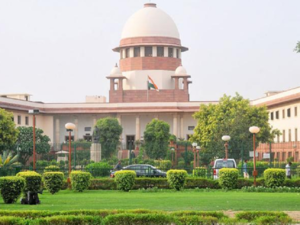HIGHLIGHTS
- The Supreme Court on Monday agreed to hear a PIL which sought full right to women to choose whether or not to continue with pregnancy
- The CJI-led bench sought response of the health ministry to the PIL which sought quashing of those provisions of the MTP Act which impose restrictions on a woman’s right to terminate pregnancy
NEW DELHI: The Supreme Court on Monday agreed to hear a PIL which sought full right to women to choose whether or not to continue with pregnancy and challenged the “severe restrictions” imposed by the “archaic” Medical Termination of Pregnancy Act(MTP), 1971, on her right to abort.
Appearing for petitioners — Gurgaon-based Swati Agarwal and Garima Sekseria and New Delhi-based Prachi Vats — advocate Sansriti Pathak did not have to labour hard to drive home the issue before a bench of Chief Justice Ranjan Gogoi and Justice Deepak Gupta and the court accepted to hear the petition which gave statistics about the legal position in other countries on termination of pregnancy and juxtaposed it with the violation of right to life of women in India through the 50-year-old MTP Act.

The CJI-led bench sought response of the health ministry to the PIL which sought quashing of those provisions of the MTP Act which impose restrictions on a woman’s right to terminate pregnancy. Under the law, a woman can terminate her under 12-week-old pregnancy only if a registered medical practitioner certifies that continuance of such pregnancy would pose a grave threat to her mental health or life, or if the foetus is abnormal. Most unwanted pregnancies are aborted in the country after the doctor certifies that going ahead would cause mental stress to the woman.
If the pregnancy exceeds the 12-week gestation period and is below 20 weeks, termination requires the concurrent opinion of two registered medical practitioners when other factors — threat to life of mother or abnormal foetus — remain same. The law also permits termination of pregnancy caused by rape, saying continuance of such pregnancy would cause grave injury to the woman’s mental health.
Pathak argued that right of reproductive choice was at the core of liberty and personal autonomy guaranteed under Article 21. She cited the nine-judge bench decision on right to privacy in Aadhaar case and said, “Right to choose whether to conceive and carry pregnancy to its full term or to terminate it is at the core of one’s privacy, dignity, personal autonomy, bodily integrity, self-determination and right to health.
“The state cannot compel a woman to continue a pregnancy against her will when continuance of pregnancy will entail physical, mental and socio-economic consequences which far outweigh the consequences that may ensue on termination of pregnancy… She should have the right to choose a course which is less disadvantageous to her.”
Referring to an explanation to Section 3(2) of MTP Act, the petitioners said termination of pregnancy was permitted if it occurred because of failure of any device or method used by a married woman or her husband for the purpose of birth control and if such a pregnancy could cause grave injury to mental health of the pregnant woman.
This provision amounted to hostile discrimination against single women who should have the right and choice to terminate an unwanted pregnancy, they said. “An unwanted and unplanned pregnancy will invariably cause graver consequences to an unmarried woman,” they said.
Pathak gave statistics of many countries that give women free choice to request abortion at varied gestational age of foetus. While Canada permits abortion at any stage of pregnancy, China, Netherlands and Australia prescribe 24 weeks, Vietnam 22 weeks and Sweden 18 weeks. A 12-week limit is prescribed by Austria, Belgium, Norway, Switzerland, Denmark and Russia.
She cited several instances from the past when women had to move the SC for termination of their pregnancies which were beyond the 20-week period provided for under MTP Act, on detection of abnormality in foetus. Pathak said MTP (Amendment) Bills of 2014 and 2017 had proposed to enhance the outer limit to 24 weeks. Both the bills are pending.


